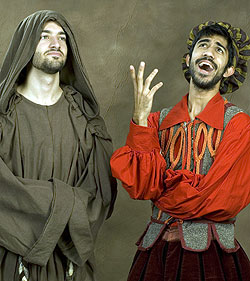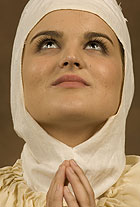One of Shakespeare’s most confounding “problem plays,” “Measure for Measure” explores the nature of power, the relationships between men and women and the battle between justice and mercy.
In November, the Performing Arts Department (PAD) in Arts & Sciences will present a two-weekend run of “Measure for Measure” in the A.E. Hotchner Studio Theatre in the Mallinckrodt Student Center. Performances begin at 8 p.m. Nov. 9 and 10, and at 2 p.m. Nov. 11. Performances continue the following weekend at 8 p.m. Nov. 16 and 17, and at 2 p.m. Nov. 18.

Set in 16th-century Vienna, “Measure for Measure” opens with Duke Vincentio (junior Justin Joseph), a virtuous yet perhaps overly-indulgent ruler departing on a diplomatic mission. In his absence the task of governing falls to Angelo (senior Kelly Riley), an austere and moralistic judge who decides to rid the city of vice and immorality. Angelo soon arrests a young man, Claudio (senior Lee Osorio), for impregnating his betrothed, Juliet (senior Laura Alexander), out of wedlock. Though the couple are willing to marry, Angelo — determined to make an example — sentences Claudio to death.
News of Claudio’s plight soon reaches his sister, the postulate nun Isabella (senior Rosie Mandel), who pleads with Angelo for mercy. Though he remains pitiless, Angelo is overcome by his own lust for Isabella and offers to free Claudio if she will sleep with him.
“Isabella is completely stunned and, for the sake of her chastity, immediately refuses,” said Annamaria Pileggi, senior lecturer in drama in Arts & Sciences, who directs the cast of 23. “But when she tells Claudio what happened, he asks her to acquiesce, saying that ‘death is a fearful thing.’ ”
Yet the duke, it turns out, has not left Vienna. Wishing to secretly observe the city’s affairs, he has disguised himself as a humble friar and in this guise visited the local prison, where he learns of Claudio’s predicament as well as Angelo’s proposition.
“There is a method to the duke’s madness,” Pileggi said. “As a ruler, he has perhaps erred on the side of mercy and so absents himself to see how an extremist, in the person of Angelo, handles power. And of course Angelo doesn’t handle it well, but falls to temptation.
“The duke spends the rest of the play trying to right these wrongs,” Pileggi said. “He befriends Isabella; arranges a ‘bed trick’ involving Mariana (senior Lisa Sullivan), Angelo’s jilted fiancée; and stages other deceptions before ‘returning’ to the city as himself.
“I think the journey of the play is towards balance,” Pileggi said. “In the end it’s about redemption, about finding ways to temper justice with mercy.”
The cast also features junior Sathya Sridharan as the flamboyant bachelor Lucio; and junior David Weiss as Escalus, Angelo’s more moderate advisor.
Rounding out the cast are senior Noga Landau as Mistress Overdone, a local madam, and senior Ian Pearson as Pompey, a “bawd,” or pimp, who works for Overdone.
Senior Kellen Hoxworth is the provost in charge of the prison, while junior Jonathan Baude plays Elbow, a dim-witted constable. Sophomore Aaron Kaplan is Barnardine, another prisoner sentenced to death.

Set designs are by Angela Bengford, lecturer in the PAD. Costumes are by senior Robin Vane. Lighting is by lecturer Sean Savoie.
Tickets are $15, or $9 for students, senior citizens, faculty and staff. For tickets or more information, call the Edison Theatre Box Office at 935-6543.
In addition to the performances, Pileggi and the designers will host a special presentation titled “Four Ways of Reading a Scene” at 4:30 p.m. Nov. 13 in the Hotchner Studio Theatre.
The event, which is free and open to the public, will feature a full performance of one scene from the play, followed by a roundtable discussion about the decision-making processes that inform the journey from the page to the stage.
“We want to complement the close and attentive reading of Shakespeare done by students and faculty in the English department with the kinds of reading that theater directors and designers do — and perhaps think about similarities and differences in the literary and the performance-based ways that we read Shakespeare,” said Robert Henke, chair of PAD and associate professor of drama and comparative literature in Arts & Sciences, who will moderate the discussion.